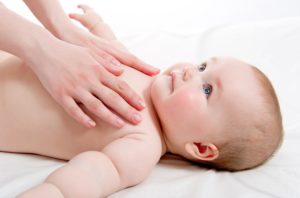Why Infant Massage isn’t just for mothers…
 By Stephanie Gross, Director of Gymboree Play & Music St Albans.
By Stephanie Gross, Director of Gymboree Play & Music St Albans.
Increasingly, today’s fathers want to be emotionally bonded with their babies. However, men often feel dissatisfied with their ability to form this meaningful relationship. Fathers often worry they may be disadvantaged in developing this special relationship because women appear to have more opportunities and to be better equipped through various anatomical, physiological, and psychological adaptations; However, although men generally lack these predisposing parental mechanisms, they are equally capable of potentially developing a successful parental relationship. Fathers need to know that although their relationship with the child develops through different means, it can be equally as valid as the mother’s relationship. One proposed suggestion for helping fathers develop a relationship with their very young child is using the power of touch to help foster infant–father relationships.
Touch is our most primal sense and is associated with the largest organ in the human body—our skin. Of all the senses to develop, touch is the first and begins before the baby is born. In the first few months of life, touch is used more often than hearing, sight, or smell as a way to learn about the physical world and to develop close, meaningful relationships. Touch is a powerful communicator because it often mirrors our own feelings toward another individual. Ultimately, infants are able to sense how their parents feel about them by the manner in which they are touched.
In situations where infants are separated from their parents, such as war or famine, the detrimental effects of touch deprivation are evident. Blackwell (2000) states that “at the beginning of the 20th century, in war-torn Germany, infant mortality in residential care was as high as 71.5%. The reported cause of death was termed hospitalism, which is described as a lack of stimulation by an adult caregiver rather than death by poor nutrition or insufficient medical care”. A more modern example where touch deprivation occurs is in the neonatal intensive care unit. Infant massage has been employed in both of these kinds of environments and has successfully mediated the potentially negative consequences (Field, 2001).
Scholz and Samuels (1992) suggest that providing caregiving education, such as infant massage, for new fathers can greatly impact the quality of the infant–father relationship. In their study, participating fathers appeared to “thrive on the emotional and motivational or attitudinal benefits of the increased opportunity to touch their infants”. Similarly, Cullen, Field, Escalona, and Hartshorn (2000) found fathers who massaged their infants were more “expressive, warm, and accepting in their interactions with their infants”. Considering the potential benefits of infant massage for fathers, measuring perceived paternal stress is an area of research that appears to be under investigated.
The transition to parenthood is a developmental milestone that many men and women undertake in their lifespan. Although this transition is considered normal, it is also regarded as stressful. This transition may be even more stressful for fathers as they often do not have the same support and confidence in their abilities to parent. Because fathers experience a greater desire and social shift in their involvement in infant care, they may experience even greater stress in the transition to parenthood.
Teaching infant massage to fathers appears to improve their feelings of efficacy toward being a parent. “Learning to love is a matter of neurobiology. And it begins with meeting babies’ basic needs” Porter, 2009.
Stephanie holds IAIM infant massage sessions on-site; her next course starts on Saturday 1st September please contact for more information:
stalbans@gymboreeclasses.co.uk 01727 831551
To find out more about IAIM please follow this link : http://www.iaim.org.uk/
To find out more about Gymboree Play & Music please follow this link : www.gymboreeclasses.co.uk

